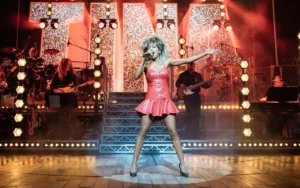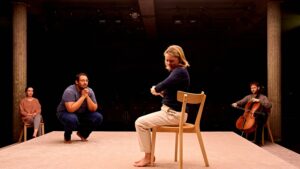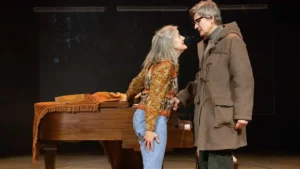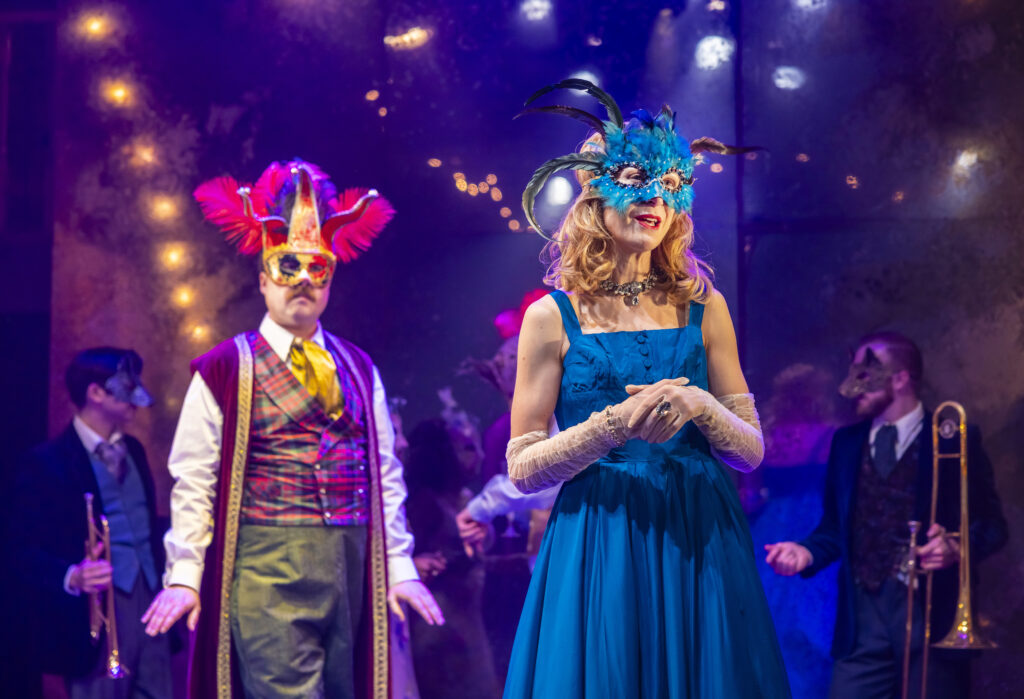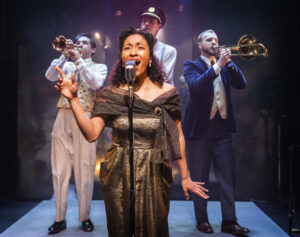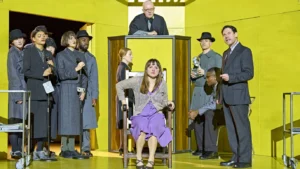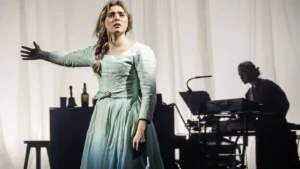Lyceum Hammersmith

Minority Report started as a sci-fi story by Philip K Dick but its most famous manifestation is as a film starring Tom Cruise. Inevitably, a number of the reviews compared the budget theatrical version by David Haig to the multi-million dollar Hollywood spectacular…unfavourably. In the critics’ reports, no-one awarded more than three stars, mainly because the plot is ‘muddled’ and ‘too sketchy’ and, for some, it looks ‘naff’. On the plus side, the lead Jodi McNee‘s performance was widely praisedand some liked the fast pace supplied by director Max Webster (Life of Pi) and the ‘ambitious visuals’.
[Links to full reviews are included but a number are behind paywalls and therefore may not be accessible]
Dominic Cavendish in the Telegraph (3★) was upbeat. He felt that while ‘his adaptation is admirably succinct, the political and psychological dimensions of the piece, hurtling by in 90 minutes, feel too sketchy.’ He looked for the positive: ‘in its most exhilarating moments, with search-lights criss-crossing the auditorium, you get a reminder that theatre can, and should, be exciting – and an inkling too of its tech-assisted future.’
There is no star rating attached to Time Out. It’s possible he thought it was so bad, it didn’t deserve any stars, but more likely there was a glitch on the website. At best, it feels like a three star review: ‘Although the many, many action setpieces in Max Webster’s production are accomplished, it’s hard to see the point in most of them… Even more muddled is the plot.’ He liked its lead: ‘McNee is charismatic and intense and looks pretty cool carrying a big gun while shouting at people.’ His conclusion was: ‘If this is the future I want no part in it.’
Anya Ryan in The Stage (3★) had mixed feelings. ‘The production has a slick air of ultra modernism, and whizzes through scenes at a relentless pace. Despite some spectacular, ambitious visuals, though, there’s the nagging sense that the theatre might not be the best medium for this dystopian fable.’
Nick Curtis at The Standard (3★) summed it up as ‘smart and daft, mind-expanding and lame’. Every aspect of the production gets a mention, not always complimentary . ‘Designer Jon Bausor uses pivoting metal grids and video screens … which is inventive but inevitably a bit naff’; ‘Director Max Webster favours pace and stridency over subtlety’; ‘The stimulating intellectual provocations of the script are constantly undermined by clichéd and slapdash plotting.’
‘There is plenty of dazzle, but little dilemma,’ said Susannah Clapp in The Observer (3★). Sarah Crompton at WhatsOnStage (3★) said ‘Despite a virtuoso production by Max Webster and his design team, which transforms a tiny stage into a richly realised vision of the near future, it never quite grips as drama.’ She went on, ‘It looks magnificent, but it never really digs below its sharp, hi-tech surface.’
Clive Davis in The Times (3★) ‘Jodie McNee’s harassed neuroscientist/CEO…holds your attention even when you can’t help noticing that the bargain-basement tech surrounding her is more reminiscent of Blake’s 7 than a Hollywood epic.’ He described ‘vehicles that are supposed to be something out of an Elon Musk sketchbook but actually resemble the car rides that keep children entertained in shopping centres’. On the plus side, ‘Haig poses useful moral questions about the trade-off between freedom and security. And McNee is hypnotically intense.’
Arifa Akbar in The Guardian (2★) was more critical: ‘this is a strangely lifeless creation – a zombie hybrid of film and stage. David Haig’s script has an undercooked plot filled with anaemic twists, while both the action and pace need finessing’. She continued, ‘the tension so necessary for an action drama of this kind is lacking.’ She found ‘the 3D set unmatched by its hollow 2D drama.’
Alexander Cohen at Broadway World (2★) came up with an interesting analogy: ‘David Haig’s new stage adaption is more like a cyberpunk-themed orgy at Printworks.’ (Printworks is a chain of entertainment centres but I’m not sure that particular activity is one of the attractions.) He went on to tear apart the show: ‘the production’s retro Dr Who-style brand of schlocky futurism and plastic campiness blocks it from conjuring any sense of pulsating paranoia.’ It was, he said, ‘Gormless fun for a while, but a beating emotional heart is noticeably absent.’
Minority Report can be seen at the Lyric Hammersmith until 18 May 2024. Buy tickets direct from the theatre
Average critics’ rating 2.6★
Value Rating 57 (Value rating is the Average Critic Rating moderated by the typical ticket price. In theory, this means the higher the score the better value but, because of price variations, a West End show could be excellent value if it scores above 30 while an off-West End show may need to score above 60.
If you’ve seen Minority Report, please add your review and rating below
